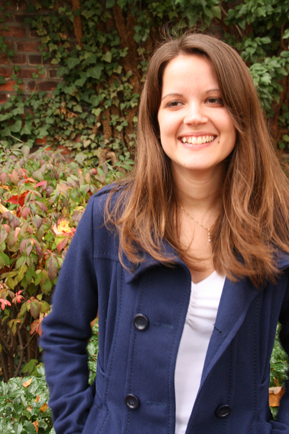Giving a Voice to the Homeless
COM student organizes journalism workshops for writers with no place to call home.

This semester Elizabeth Mehren divided the city into beats for her journalism and reporting class and asked her students to pick one. Brittaney Kiefer chose Beacon Hill.
“That’s an interesting area,” says Mehren, a College of Communication journalism professor and a former New England bureau chief and national correspondent for the Los Angeles Times. “It’s got the State House, it’s got incredible wealth, it’s got Charles Street. But it’s also got Boston Common."
Unbeknownst to Mehren, Florida native Kiefer (COM’10) had already developed a personal beat — homelessness. This semester, in addition to covering meetings about homelessness at the State House and profiling Boston shelters, Kiefer has been interning at Spare Change News, Boston’s street newspaper. Published by the Homeless Empowerment Project, the paper is sold by street vendors, who are usually homeless or close to homelessness. Much of the paper’s content — articles, poems, essays — is written by members of the community it serves. Vendors help support themselves by purchasing the papers for a quarter and reselling them for a dollar.
To further the cause, Kiefer has organized two writing workshops — one this month and one next month — for Spare Change News writers and others in the homeless community. And she has enlisted Mehren and Phyllis Karas, a COM lecturer and also a veteran reporter, to help her lead the sessions. “Social justice is a strong part of Brittaney’s makeup and one reason she wants to be a journalist,” Mehren says. “Some kids might be interested in something, but she’s actually living it.”
BU Today talked to Kiefer about her commitment to the homeless and her faith in journalism.
BU Today: How did your passion for social justice come about?
Kiefer: I was born in Tampa, but my family moved to a small town when I was 10. You don’t really see people there living on the streets. The summer before my senior year in high school our family took a trip to Pennsylvania. We went into Philadelphia, and there were so many homeless people. It really affected me, as did moving to Boston. Seeing people on the streets and seeing the poverty in certain parts of the city — it’s hard for me to ignore that.
How does Spare Change impact the lives of Boston’s homeless?
The vendors are either homeless or at risk of homelessness, so they sell this newspaper for extra income and to develop job skills. It’s hard to sell something on the street. Also, Spare Change is a voice for the homeless community. It’s advocacy journalism. We do a lot of different kinds of stories, but there is a page called “Voice from the Street” that’s all written by homeless writers. We definitely hope to be a voice for that community, because they don’t really have one in the mainstream media.
What to you hope to accomplish with workshops for writers?
The articles that come in to Spare Change might have grammar mistakes or use the passive voice, and I just felt these writers could really benefit from a workshop to teach them basic ways to clean up their writing. I also wanted them to get a glimpse into the field of journalism, because a lot of people who write for us are volunteers and probably don’t have a formal writing education. But there’s a lot of potential there. I’m excited that the BU professors will talk at the workshops. They’re professional journalists. They have a lot of experience to share, which is something I’m privileged to get being in journalism school. But so many people don’t have that privilege.
What are your plans after college?
I definitely want to do something that includes writing. But being involved with Spare Change these last couple of months, I’ve become interested in nonprofit work. So I’m considering looking for a job in communications for a nonprofit. Even if I don’t become a social activist, I always want to be involved with social justice in some way and not just become removed from suffering. I hope I can use my education to empower other people to have a voice.
Like the old journalism creed: comfort the afflicted and afflict the comfortable?
Yes that’s what’s journalism is supposed to be. It’s easy to lose sight of that and do stories that are comfortable, which is still fine. I love doing a story like reviewing a new store that’s opened. Those stories are fun, and there’s a place for them. We just need to keep in mind that if we’re going into journalism, or any kind of communication, we have a responsibility to pay attention to the people who don’t have a voice.
According to the National Law Center on Homelessness and Poverty, approximately 3.5 million people, 1.35 million of them children, are likely to be homeless in a given year. In Boston, according to the city of Boston’s annual homeless census, for the 2006-2007 winter that figure was 6,636, an increase of 4 percent over the previous year.
Caleb Daniloff can be reached at cdanilof@bu.edu.
Comments & Discussion
Boston University moderates comments to facilitate an informed, substantive, civil conversation. Abusive, profane, self-promotional, misleading, incoherent or off-topic comments will be rejected. Moderators are staffed during regular business hours (EST) and can only accept comments written in English. Statistics or facts must include a citation or a link to the citation.